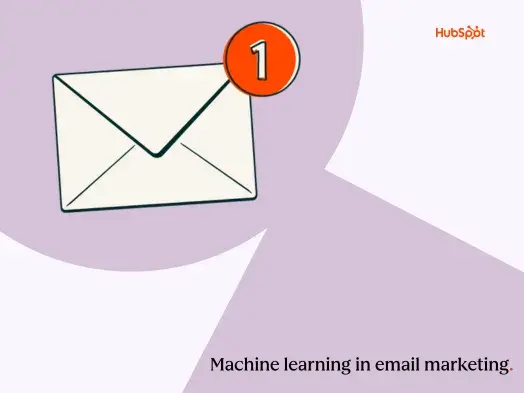How is AI driving marketing automation?
At its core, AI uses machine learning to mimic how humans learn and improve accuracy by analyzing large stacks of data. When applied to marketing automation, AI analyzes vast data sets to pinpoint patterns, predict customer behavior, and make immediate decisions.
As a result, AI and machine learning algorithms are helping marketers automate and optimize tasks that would otherwise be tedious, time-consuming, and expensive. So, it's no surprise that AI marketing automation is here to stay.
In 2020, the global market for marketing automation was $4,438.7 million, and it's expected to grow to $14,180.6 million by 2030. Moreover, the top 28% of businesses actively use marketing automation and AI tools in their process.
Why Marketers Should Use AI in Marketing Automation
AI-powered marketing automation can streamline marketing processes. This gives marketers the time and space to focus on other aspects of their job — such as brainstorming and strategizing — whether you’re an agency, an in-house marketing team, or anything in between.
AI marketing automation also makes sending personalized content to customers easier, thanks to data and algorithms. Other benefits include cost efficiency and optimization of ROI.
Automating repetitive tasks can save money. For example, using AI chatbots to communicate with customers would eliminate the need for human customer service agents, which can save costs over time.
And companies that implement AI in marketing see an average increase in ROI of up to 30%, according to a study by Accenture.
Ways Use AI in Marketing Automation
Below are some ways marketers can leverage AI to automate their processes.
Personalization
McKinsey's Next in Personalization Report shows 71% of consumers expect companies to provide personalized interactions. Furthermore, 76% of consumers experience frustration when they don't receive personalized interactions.
Creating personalized experiences for all of your customers can be tedious, time-consuming, and unrealistic without automation.
AI can automate the process by analyzing customer data and behaviors and using that information to tailor each customer's experience.
For example, Whole Foods leverages AI to provide customers with personalized messaging.
In 2021, Whole Foods opened several Just Walk Out stores across the U.S. The stores allow customers to pick up their items and leave without stopping at a register.
Instead, the items are charged via AI. The purchase information gathered by the AI is then used to identify patterns and predict future behaviors. This allows the AI to send personalized messages to customers.
So, if a customer purchases frozen vegan dinners, Whole Foods could send promo codes and discounts for other vegan products.
Email Automation
Marketers can send tons of emails to potential leads, but it can take significant time away from more big-picture duties. Your company can quickly send thousands of personalized emails using AI for marketing email automation.
This is especially helpful as your email list grows because who has time to send 200,000 emails multiple times a week?
Furthermore, AI can analyze the performance of your emails in real time, and you can use the data to improve your next set of emails.
Lead Scoring and Nurturing
AI can quickly and efficiently analyze data to determine which leads will likely become customers. With AI, marketers can save time and money on lead scoring while improving their leads' quality.
AI can also automate the lead nurturing process by effectively guiding leads through the sales funnel until they are ready to purchase, boosting conversion rates.
Predictive Analytics
Part of being a successful marketer is being proactive and anticipating trends. Fortunately, AI is an excellent tool for analyzing and predicting customer behavior and trends thanks to algorithms.
This will allow marketers to adjust their marketing strategies according to predictive data. For example, the data can help a business predict the best time to launch a new product.
Channel Optimization
There are many channels to consider when marketing your brand, product, or service. With Al algorithms, marketers can easily identify which channels are the most effective in reaching their target audience.
This allows marketing to properly allocate time and funds to channels with the best return on investment.
Customer Service and Communication
62% of consumers would prefer to use a customer service bot rather than wait 15 minutes for human agents to speak with them.
Using AI to respond to customers instantly will improve your customer's experience and satisfaction while saving time and resources.
AI-powered chatbots can answer frequently asked questions, recommend products, and process orders faster than a team could manually.
Successfully implementing AI Marketing Automation
To leverage AI marketing automation, you must identify the best tools and platforms to help you reach your marketing goals. From chatbots to software to AI-powered platforms, there are many applications to choose from.
For example, HubSpot's content assistant is a suite of free, AI-powered features that uses generative AI to help create and share materials such as written content, outlines, and emails.
We also offer ChatSpot, a conversational CRM bot that marketing professionals can connect to HubSpot to maximize productivity.
The feature uses chat-based commands to interact with your CRM data, so you can accomplish everything you already do in HubSpot faster.
You don't have to be super tech-savvy to implement AI marketing automation into your business.
All you need is to identify repetitive tasks within your process that could be improved by automation, then find the right tools or software to suit your needs.
Now that you know what AI marketing automation is, you're ready to find ways to use it.
Artificial Intelligence









-1-20250905-2237709%202.webp)

![I tested the top 14 AI chatbots for marketers [data, prompts, use cases]](https://53.fs1.hubspotusercontent-na1.net/hubfs/53/best-ai-chatbot_1.webp)
%20NEW%202025.webp)